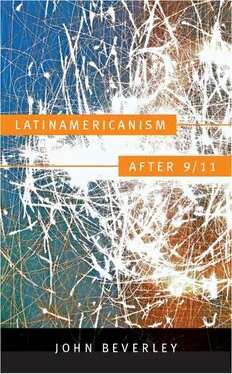
Latinamericanism after 9/11 PDF
Preview Latinamericanism after 9/11
Latinamericanism after 9/11 Post-Contemporary Interventions series editors: Stanley Fish and Fredric Jameson Latinamericanism after 9/11 john beverley duke university press durham & london 2011 © 2011 Duke University Press All rights reserved Printed in the United States of America on acid- free paper ♾ Designed by Katy Clove Typeset in Minion by Tseng Information Systems, Inc. Library of Congress Cataloging- in- Publication Data appear on the last printed page of this book. For reynolds smith Contents Introduction 1 1. Latinamericanism after 9/11 17 2. The Persistence of the Nation (against Empire) 26 3. Deconstruction and Latinamericanism (apropos Alberto Moreiras’s The Exhaustion of Difference) 43 4. Between Ariel and Caliban: The Politics of Location of Latinamericanism and the Question of Solidarity 60 5. The Neoconservative Turn 72 6. Beyond the Paradigm of Disillusion: Rethinking the Armed Struggle in Latin America 95 7. The Subaltern and the State 110 Notes 127 Bibliography 145 Index 155 Introduction I am not sure exactly when or where the term “Latinamericanism” (or, as it is more usually written, “Latin Americanism”) originates. But its cur- rent usage is almost certainly a consequence of Edward Said’s Oriental- ism, which was originally published in 1978. Alberto Moreiras—whose own book on Latinamericanism, The Exhaustion of Difference, I take up in chapter 3—claims that the first use of the term in a sense coincident with Said’s comes in two essays by Enrico Mario Santí from the early 1990s, just as the implications of the postcolonial turn, cultural studies, and multi- cultural identity politics began to percolate into the Latin American field.1 The first book- length articulation of the term that I am aware of is Román de la Campa’s book Latin Americanism (1999), which I am indebted to in several ways here—indeed, this book could be considered an updating, or reframing, of some of its major concerns. There (with, however, only a passing reference to Santí) de la Campa describes Latinamericanism as “a community of discourses [about Latin America] that has gained par- ticular force during the past few decades, mainly in the United States, but also beyond.”2 Moreiras himself defines what he calls “Latin American- ist reflection” as “the sum total of academic discourse on Latin America whether carried out in Latin America, the United States, in Europe, or elsewhere.”3 The word Latinoamericanismo appeared prominently in the title of an influential 1998 collection on these issues published in Latin America, Teo- rías sin disciplina: Latinoamericanismo, poscolonialidad, y globalización en debate.4 In 2002, the Centre for Latin American and Caribbean Studies at
